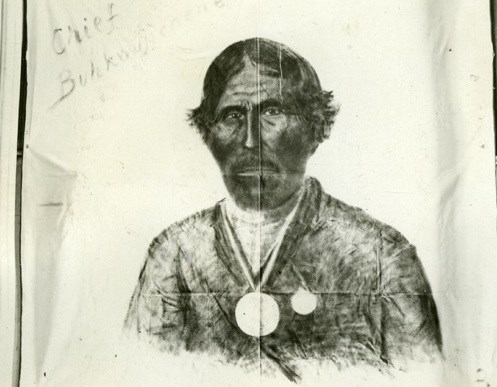From the archives of the Sault Ste. Marie Public Library:
As the son of the famous Chief Shingwauk, Buhgwujjenene was born in 1811 and was the last hereditary chief in Garden River.
He was the second oldest son and was considered a warrior as well. Although he never fought in a war he did fight for peace and justice. He was described as a man of incredible intelligence and was well known for his memory. He seemed to have an unlimited knowledge of native folklore, retelling stories of his life.
Like his father, Chief Shingwauk, Buhgwujjenene converted to Christianity in 1835. In his youth he met historian Henry Schoolcraft, and this would later develop into a strong friendship. Schoolcraft spent most of his life travelling and chronicling the history of the native people throughout North America. Schoolcraft took Buhgwujjenene with him on some of these journeys, exposing him to the traditions of other native peoples. One of these journeys was a year-and-a-half-long expedition on the great Mississippi.
When Chief Shingwauk and his family moved to Garden River, Buhgwujjenene built a house for himself and settled down with his wife. His father had actually selected another woman for his son to marry however Buhgwujjenene had fallen in love and wanted to marry someone because he loved her rather than accept an arranged marriage. They were married in the Anglican Church. He continued to live off the land by planting a garden and growing potatoes and corn and making (maple) sugar when it was in season. He hunted for meat, trapped animals to obtain furs and set nets for fish to feed his family.
Chief Shingwauk wanted his people to learn to read and write in English but in order to make Chief Shingwauk’s dream for a school for the children a reality, significant funds were needed. So in 1874 Reverend E.F. Wilson who was a missionary working with the native peoples in this area invited Buhgwujjenene to travel to England with him in order to raise funds for the new Shingwauk Hall. Buhgwujjenene was a very eloquent speaker and a wonderful representative for his people. They travelled throughout England and while there he met the Prince of Wales and the Archbishop of Canterbury.
He was so impressed with his stay in England that he stated “I shall always love the English because they were so good to me.”
The one thing that he noticed about England that bothered him was “The poor were too poor and the rich were too rich.”
Their trip was a success and upon their return Buhgwujjenene and Reverend Wilson along with Augustin Shingwauk succeeded in opening the Shingwauk Residential School in 1875.
He was well-respected and was invited to meet with many visitors who travelled through the area including Lord Dufferin and Marquis of Lorne.
When the Prince of Wales came to Canada Buhgwujjenene was presented with a medal which he wore proudly for the rest of his life along with the medal that had been presented to his father Chief Shingwauk by King George III for his role in the War of 1812.
Buhgwujjenene’s wife died around 1880 and Buhgwujjenene continued to live in Garden River until his death in 1900. He died peacefully surrounded by his children and grandchildren.
Each week, the Sault Ste. Marie Public Library and its Archives provides SooToday readers with a glimpse of the city’s past.
Find out more of what the Public Library has to offer at www.ssmpl.ca and look for more Remember This? columns here
